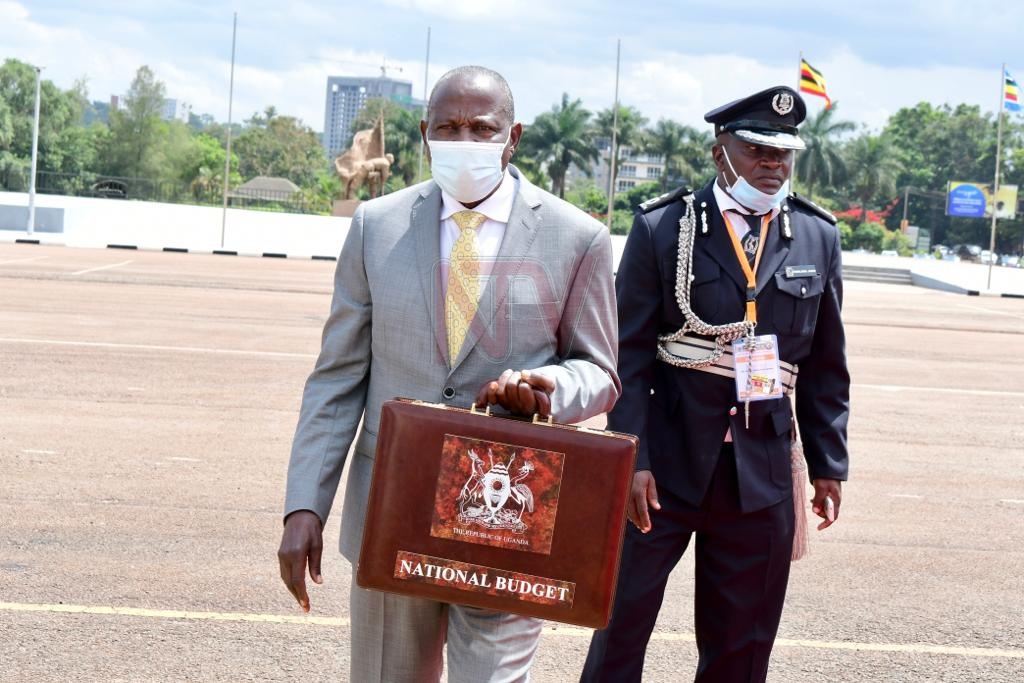UGANDA NATIONAL BUDGET 2022: A poisoned chalice?
Saturday June 18 2022

Matia Kasaija arriving at the Kololo Independence grounds on to read the 2022/23 budget on Tuesday (David Lubowa photo)
Finally, we sigh in relief after going through the yearly Constitutional ritual of budget presentation. The budget in principle should be designed to be a reflection of the sovereignty of the people (whether majority or minority is a debate for another day) in the financial aspirations of their nation's future. It is so vital that stakeholder involvement is a core feature that must be upheld. The elitist aura of budgetary complexity always overshadows its simplicity in reason to the common man. All that is softly muttered by the "wanainchi" is that the budget has been read.
What needs to be demystified is the translation of the rosy figures and statistics into actual realisation in the real lives of the people. No one eats statistics. The thorough test of budgetary relevance is its reflection on the ground.
Enter the "game-changer" narrative. By now, you have heard government technocrats dangle the proverbial carrot in the faces of the populace through this notion. The Prime Minister, Rt. Hon. Nabbanja has tirelessly alluded to the key imperative for implementing the budget as the Parish Development Model (PDM). The idea of the model is redistribution and responsiveness to the "national priorities". We have a detailed National Development Plan which the implementors consistently depart from to enhance "urgent" needs through supplementary budgets and subsequently underfunded key priorities. In essence, we have national priorities and supplementary priorities.
The rubber hits the rod not when the budget is read but rather when implementation is assessed. Reference to the Auditor General’s reports will manifest consistent challenges that we seem not to realize. Our failure to achieve planned targets is attributed to the vicious cycle of slow implementation of core projects, limited prioritization, inadequate sequencing of interventions and land-related constraints because this is a key factor of production relevant for PDM. For example, limited access to capital, low levels of revenue to GDP, finance infrastructure and social services.
The relevant gauge for the ordinary citizen to thoroughly assess government performance is embedded in the little-known or popularised Service Delivery Standards authored by the dismally funded Ministry of Public Service. Development, documentation and implementation of these standards are either inexistent or terrible.
The 2022 budget aspires to cushion the economy from future shocks by implementing appropriate fiscal and monetary policies to mitigate the impact of price shocks which cause long-term distortions in the economy. Should we turn a blind eye to the fact that the government adopted inappropriate, untested, coercive and unsustainable blanket measures to respond to the COVID-19 pandemic? Should we exonerate ourselves from our citizenry's duty of resisting such measures? Should we take the convenient global excuses that we were responding to biased and compromised global forces? Cushioning the economy shouldn't just be a mere statement of aspirations. It ought to be a deliberate decision we take to cushion ourselves from even global influences. Is the hefty Ugx 628 billion towards the now hijacked global agenda towards climate change one of our most urgent needs?
Why wouldn't we rather refocus on fully funding and replenishing the contingencies fund under Section 26 (1) of the Public Finance Management Act 2015 (as amended)? Underfunding of this Fund distorts the implementation of the approved budget for the current year as evidenced by requests and approvals of supplementary funding related to natural disasters and emergencies. The majority of the supplementary budgets have been passed without approvals through detailed schedules of supplementary revenue.
How can we speak fiscal discipline when we haemorrhage over Ugx 67 billion due to garnishee orders against the government? The budget made no specific mention of a strategy of debt management arising out of court awards as a means of limiting recourse to garnishee of Government accounts. Subsequently, the implementation of planned government programmes is diverted in honour of court orders.
If indeed the budget is designed to be responsive to Ugandans' needs, let's pay attention to the core centres of citizens' interaction such as town councils. Thanks to political gerrymandering, we now have over 580 underfunded town councils. The creation of additional administrative units ought to be matched against available resources.
If it's about the "omuntu wa wansi", why not honour the promises made to the largest demographic which is the youth through PDM? From inception, the PDM must have a quota for youth in the PDM funds such that the youths' specific groups and enterprises can access their financing. Secondly, the youth monitoring roles of PDM must be prioritized at the National and district level to ensure proper interest protection and corruption management at the grassroots. Why should the youth trust the PDM when the government collapsed youth funding under the Youth Livelihood Program and youth venture capital fund and now the PDM Management Unit is shifting goal posts?
Never mind that the government is already implementing PDM without a clear legal framework and addressing key concerns around the political motivation and management of the same. Certainly, we could do better with open, consistent, objective and respectful conversations intended to have practical solutions. Maybe the Civil Society and other key stakeholders should conduct a preparedness study of the nation toward PDM. Tough talk but relevant. Looks like our economic chalice is poisoned. Slow to kill but kills anyway. Any hope for resuscitation?
The writer, Simon Ssenyonga is a lawyer.


